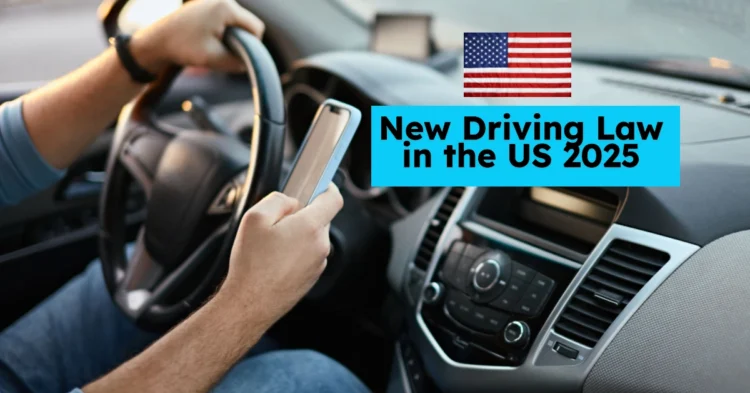In a landmark shift in U.S. traffic enforcement, a new driving law in the US 2025 is now allowing drivers to be sued for repeatedly breaking traffic laws. The Strengthening Traffic Enforcement, Education, and Responsibility (STEER) Act, enacted by the D.C. Council, is changing how reckless and repeat driving offenses are handled—especially for non-residents who accumulate violations within Washington, D.C.
Table of Contents
This article provides a detailed look at the new driving legislation, how it works, and who is already being impacted by the legal consequences of ignoring traffic laws.
What Is the New Driving Law in the US 2025?
The STEER Act, passed in February 2024 by the D.C. Council and now being enforced in 2025, empowers the D.C. Attorney General’s Office to pursue civil lawsuits against drivers who have amassed large numbers of traffic violations. This includes both residents and non-resident drivers, especially those from neighboring states such as Maryland and Virginia.
Rather than relying solely on citations or suspended licenses, the law now allows for legal action and financial recovery through lawsuits, targeting repeat offenders who have consistently endangered public safety.
Why Was the STEER Act Introduced?
The STEER Act was created in response to growing public concern over:
- Repeated traffic violations
- Escalating rates of reckless driving
- Out-of-state drivers ignoring citations
- Safety threats to pedestrians and city residents
D.C. Attorney General Brian Schwalb emphasized the purpose behind the law:
“If your actions behind the wheel put people’s lives at risk, we will hold you accountable, no matter where you live.”
New Rules for Senior Drivers 2025: Licence Renewal Processes Across All Canadian Provinces
New Canada Driving Rules for Seniors in 2025: Medical Tests and License Renewal Updates
First Lawsuits Filed Under the New Driving Law
So far, five drivers—one from Maryland and four from Virginia—have become the first to face lawsuits under the STEER Act. The infractions reveal a pattern of extreme and repeated law-breaking, including:
- Maryland Driver:
- 344 total infractions
- 316 for speeding
- 61 involved speeds of 30+ mph over the limit
- $187,200 in unpaid fines
- Virginia Drivers:
- 800 combined infractions
- One owes $77,100 for 244 violations (202 speeding)
- Another owes $69,456 for 263 infractions (246 speeding)
- A third owes $58,608 for 197 violations (163 speeding)
- The fourth is being sued for $31,316 (159 citations, including red lights and stop signs)
These drivers racked up violations over a two-year span and reportedly ignored warnings and fines.
Key Provisions of the New Driving Law in the US 2025
Under the STEER Act, the Attorney General can:
- Sue drivers who have excessive violations
- Target non-residents who evade penalties
- Seek financial compensation through the civil court system
- Encourage safer driving through accountability and deterrence
The law is intended not just to punish, but also to prevent dangerous behavior by making the consequences more serious.
What Happens If You’re Caught Repeatedly Violating Traffic Laws?
If you’re flagged under the new law, you could face:
- A civil lawsuit
- A court order to repay fines
- Potential wage garnishment or liens for unpaid penalties
- Legal costs and public exposure of your violations
The shift from simple citations to civil enforcement is a major escalation in traffic law application.
What Should Drivers Know During Traffic Stops?
In light of increased enforcement, the American Civil Liberties Union (ACLU) has issued safety guidelines for drivers during stops:
- Pull over safely and promptly
- Keep hands visible at all times
- Avoid sudden movements—wait for instructions before reaching for documents
- Remain calm and narrate your actions clearly
These tips are designed to reduce misunderstandings and promote safer interactions with law enforcement.
Why This Matters: Public Safety First
The lawsuits filed under the STEER Act reflect a broader effort to reduce traffic-related deaths and injuries, particularly from:
- Street racing
- Speeding in residential areas
- Running red lights
- Disregarding school zones and stop signs
By taking legal action, D.C. aims to send a strong message that reckless driving has real legal and financial consequences.
Final Thoughts on the New Driving Law in the US 2025
The new driving law in the US 2025 marks a turning point in how cities and states enforce traffic rules—especially against habitual offenders. As the STEER Act gains traction, other jurisdictions may adopt similar measures to crack down on high-risk drivers and protect the public.
If you’re a frequent driver in or near Washington, D.C., now is the time to drive responsibly, pay your fines, and stay within the law—or risk facing not just citations, but a lawsuit that could cost you thousands.

